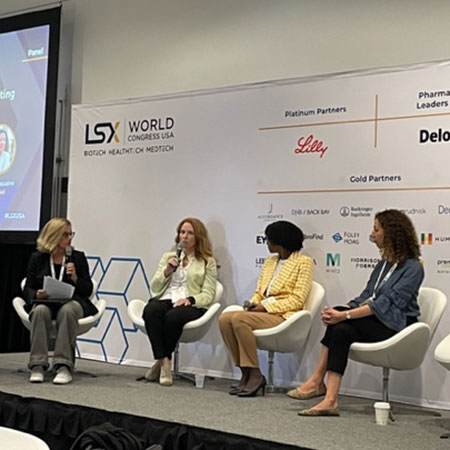Medtech DEI Experts Talk Shop: ‘It’s Going To Transform Businesses’
Executive Summary
An all-female panel of medtech DEI leaders at the LSX Congress USA conference discussed the importance of diversity and inclusion in research, clinical trials, product development and services to advance health equity as well as fundamental business goals.
Sarah Hassaine, ResMed, Inc.’s head of diversity and inclusion, offered a sobering observation during a panel discussion on health equity at the LSX World Congress USA conference in Boston last week.
“Statistics now show that 70% of DEI programs fail,” she said.
Many people still do not know what the acronym DEI (diversity, equity and inclusion) means, and even at ResMed, some do not understand what her role entails, Hassaine said. Consequently, she and her colleagues are “constantly being an advocate for ourselves, for the department and what we’re doing.”
Nevertheless, there was sharp consensus among Hassaine and the other panelists that DEI is “absolutely sustainable.” (Also see "Women’s Health Expert Panel Addresses Challenges, Opportunities In Post-Roe Era" - Medtech Insight, 30 Jan, 2023.)
“It’s going to transform businesses,” Hassaine said. “I always say I’m in the business of making businesses better, because if you’re not thinking about inclusion, you’re going to be behind, you’re not going to be thinking about all the voices and all the needs of your patients or of your people.”
Tracy MacNeal, CEO of women’s health company Materna Medical Inc, held that people who question the sustainability of DEI have it “upside down.” She explained, “If you’re not thinking about making your product available and accessible to all people, it’s a bad business model. … As a capitalist and an entrepreneur, you want to maximize the people that want to buy your product and can afford it.”
Hassaine and MacNeal were joined on stage by Paula Miller, director of diversity, inclusion and belonging at iRhythm Technologies, Inc., to discuss the importance of promoting health equity in medtech. Moderated by Medtech Insight’s Marion Webb, the 14 September panel discussion focused on three key issues: how to build diverse teams; how to identify and address bias in research and clinical trials; and how to embed the concept of equity in product development and services.
 from left Marion Webb, Tracy MacNeal, Paula Miller, Sarah Hassaine
Medtech Insight
from left Marion Webb, Tracy MacNeal, Paula Miller, Sarah Hassaine
Medtech Insight
“Empathy is the cornerstone of all of this,” MacNeal said. MacNeal recalled when she first joined the San Francisco-based Materna Medical in 2019, all board members were men. Today, the balance in Materna Medical’s board has shifted, with five of seven directors being women. Additionally, 60-70% of company employees are women, MacNeal said. (Also see "HERhealthEQ CEO Calls For Stronger Female Focus In Medtech" - Medtech Insight, 21 Jun, 2023.)
Building Trust
iRhythm Technologies Inc. markets a device approved by the US Food and Drug Administration for long-term monitoring of arrythmia events in non-critical care patients. Miller stepped into her current role at iRhythm about eight months ago and has been working since on the company’s DEI roadmap.
She pointed to the importance of building trust, which she views as being the foundation for creating partnerships in underrepresented communities.
“It means boots on the ground – and that’s part of our strategy in building partnerships within the communities that we serve,” Miller said, commenting on efforts by the firm’s health equity taskforce to identify clinical trial sites that are diverse.
MacNeal agreed that building trust with the people who are ultimately going to use a device is critical. And that goes beyond picking hospital sites in different communities and distributing literature in languages spoken in those communities.
“What we learned, especially since the health care industry hasn’t earned the trust of, in particular, Black people and Hispanic people, they don’t necessarily want to hear from me,” said MacNeal. “They maybe don’t even want to hear from the doctor, maybe a nurse, but mostly they want to hear from somebody like them – they might trust someone from church, or what we are doing in [our] patient ambassador programs.”
Hassaine said ResMed’s community outreach program is data-driven and has shown success.
“We’ve been measuring and we’re seeing more gender diversity, racial diversity, and there’s still lots of opportunity,” she said. “We’re also examining what methods work – some communities are better with email, some are better in person, some are better through social media.”
Hassaine said ResMed is taking a holistic approach when it comes to health equity.
For instance, in medical affairs, she explained, the focus is on R&D to understand health disparities and patients’ access to treatments and tests. The second part focuses on inclusive design to ensure that testing is done with people of different abilities, genders and races and also “expands into neurodiversity.”
“It has to be baked in from the beginning,” she said. “It’s a value that we’re trying to put across the business and also internally how we think about our hiring practices, our succession planning – really thinking about it internally as well as externally.”
Human Factors
MacNeal stressed the importance of “human factors strategy” in product design to ensure optimal interactions between user and device.
She noted that Materna’s second product, Materna Prep, a clinical-stage OBGYN device that aims to reduce pelvic injuries during childbirth, is used during labor and delivery. Given that every woman has a different childbirth experience, it is critical that the device not only works in different clinical scenarios but is also easy to use by clinicians, she said. Materna Medical also markets an FDA-cleared OTC all-in-one vaginal dilator to help relieve symptoms of vaginismus and other pelvic conditions.
Miller said when it comes to wearables, developers need to consider that not all skin types are the same. “We ran into that and that was a failure, not on behalf of the monitor, but because of the adhesive,” she explained. “If you don’t have diversity in your clinical trials, how would you know about the level of oil that’s secreted from a person’s skin … [and] if that adhesive is going to stick or not?”
Cultural considerations are also important in product development, Miller said.
For instance, iRhythm learned that Japanese people are more prone to taking baths compared with Americans, who generally prefer showers. When the body is fully immersed in a bathtub, it can create a problem for individuals wearing heart monitors. Because physicians are highly regarded in Japanese culture, iRhythm partnered with doctors to educate patients with heart monitors that they should take “half baths” where only the lower part of the body is submerged, Miller said.
How To Get Started
Asked what advice they would offer audience members who are in the early stages or considering implementing DEI strategies in their own organizations, MacNeal and Miller suggested to start with some simple steps.
MacNeal recalled starting with one slide that she presented to the board of directors. “I didn’t start fancy, I put it all on one piece of paper,” she said. Her advice: “Start with what you got; it will probably [go further] than what you think.”
Miller had a similar message to not “overcomplicate things” and simply put it out there as a business imperative. “Engage in the dialogue – especially in dialogue with the persons that don’t understand, because it gives you great opportunity to educate and create for multipliers.”
Hassaine similarly suggested leveraging employees and getting their feedback.
“It’s so important to come into conversations as a neutral party to try to understand what their perspective is,” she said. “Make that collective experience a collaborative issue, because you want to make sure that you have multiple stakeholders involved.”
MacNeal believes health equity pursuits are critical for healing societal ills. “I find when you get on the other side, it’s a lot more fun to be empathetic for people,” she said.
